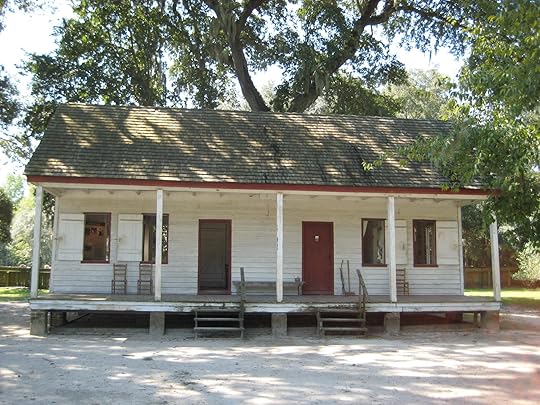Zetta Elliott's Blog, page 71
September 9, 2012
every word counts
 I haven’t blogged in a while because I figured out that I have 22 non-teaching days in the month of September, and if I write 900 words on each of those days, I’ll have the 20K words I need to finish Judah’s Tale. I got off to a good start last weekend, but this weekend I’ve fallen short—instead of writing 2000 words yesterday I wrote 200! But that’s because I spent most of the day completing a grant report (500 words) and working on an application for a faculty publication program (1350 words). That’s one thing about my job—you constantly have to apply for things. Still, it’s a pretty great opportunity—you get paired with a writing mentor, you meet eight times with other writers within your field, and you get 3 hours of course release for the spring semester, which means one less class to teach. My classes are going fairly well so far, but I’m reminded—once again—of how impossible it is to turn your brain off when you teach. It’s not like a 9-5 where you clear your desk at the end of the day and go home to dwell on other things. With teaching you’re always making a mental list of the things you need to say and do and plan and fix. And then there are the endless emails asking for help; I’m not a medical doctor but I do sometimes feel like I’m on call! It’s part of the job, and I do love to teach, but maybe I’m not being realistic about finishing Judah’s Tale this month. My (pipe) dream is to finish two novels this semester, which would free me up to start The Hummingbird’s Tongue in January. A friend and I are considering London for Xmas, which means I need to budget carefully so that I can do London in December, Nevis in January, and Ghana in May. My travel allowance is $450 so that means I need to get really creative…counting words and counting pennies!
I haven’t blogged in a while because I figured out that I have 22 non-teaching days in the month of September, and if I write 900 words on each of those days, I’ll have the 20K words I need to finish Judah’s Tale. I got off to a good start last weekend, but this weekend I’ve fallen short—instead of writing 2000 words yesterday I wrote 200! But that’s because I spent most of the day completing a grant report (500 words) and working on an application for a faculty publication program (1350 words). That’s one thing about my job—you constantly have to apply for things. Still, it’s a pretty great opportunity—you get paired with a writing mentor, you meet eight times with other writers within your field, and you get 3 hours of course release for the spring semester, which means one less class to teach. My classes are going fairly well so far, but I’m reminded—once again—of how impossible it is to turn your brain off when you teach. It’s not like a 9-5 where you clear your desk at the end of the day and go home to dwell on other things. With teaching you’re always making a mental list of the things you need to say and do and plan and fix. And then there are the endless emails asking for help; I’m not a medical doctor but I do sometimes feel like I’m on call! It’s part of the job, and I do love to teach, but maybe I’m not being realistic about finishing Judah’s Tale this month. My (pipe) dream is to finish two novels this semester, which would free me up to start The Hummingbird’s Tongue in January. A friend and I are considering London for Xmas, which means I need to budget carefully so that I can do London in December, Nevis in January, and Ghana in May. My travel allowance is $450 so that means I need to get really creative…counting words and counting pennies!


August 30, 2012
Study with the Best!
In June I was filmed at the African Burial Ground National Monument for an episode of CUNY TV’s Study with the Best. The show aired on channel 75 here in NYC last Sunday and will air again this Saturday at 7pm. You can also watch it on You Tube or below (my 5-minute segment starts at 7:30 min.):



August 27, 2012
shifting gears
 Classes start tomorrow so my head is no longer in SC—but before I shift gears, here are some of the photos I took at the Middleton plantation. As soon as I stepped on the bus Saturday morning, the conversation about Gone with the Wind began…to his credit, our driver tried to separate fact from fiction: apparently Rhett Butler was a real person but the film was not shot on site in the South—it was shot in Hollywood. HOLLYWOOD, people. When we reached Middleton Place I was almost relieved to see that the “big house” was no longer standing; the Union army burned it during the war and then an 1886 earthquake reduced the ruins to rubble. And it was never one of those white-pillared houses at the end of a long lane of live oaks (this photo is of McLeod Plantation on James Island). The main house and two flanking guesthouses were made of brick; one guesthouse was left standing but I skipped that
Classes start tomorrow so my head is no longer in SC—but before I shift gears, here are some of the photos I took at the Middleton plantation. As soon as I stepped on the bus Saturday morning, the conversation about Gone with the Wind began…to his credit, our driver tried to separate fact from fiction: apparently Rhett Butler was a real person but the film was not shot on site in the South—it was shot in Hollywood. HOLLYWOOD, people. When we reached Middleton Place I was almost relieved to see that the “big house” was no longer standing; the Union army burned it during the war and then an 1886 earthquake reduced the ruins to rubble. And it was never one of those white-pillared houses at the end of a long lane of live oaks (this photo is of McLeod Plantation on James Island). The main house and two flanking guesthouses were made of brick; one guesthouse was left standing but I skipped that 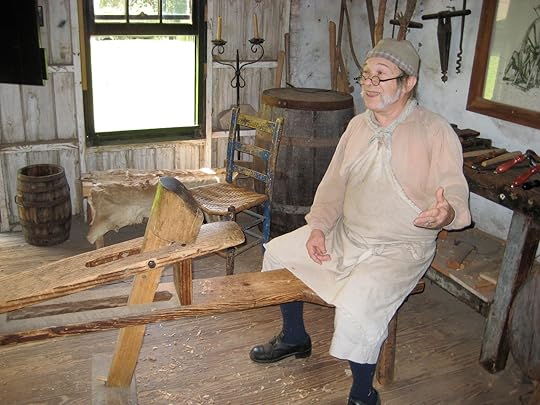 tour, opting instead to learn about African Americans’ lives on this rice plantation. My tour guide was a white man from upstate New York—very nice, very informed. But all the interpreters in the Stableyards were also white…which seemed odd. But then how many black folks do you know who’d volunteer to dress up and act the part of a slave? Doug the cooper gave me lots of great information about woodworking tools, which will help since Judah is apprenticed to a carpenter in the sequel to Wish.
tour, opting instead to learn about African Americans’ lives on this rice plantation. My tour guide was a white man from upstate New York—very nice, very informed. But all the interpreters in the Stableyards were also white…which seemed odd. But then how many black folks do you know who’d volunteer to dress up and act the part of a slave? Doug the cooper gave me lots of great information about woodworking tools, which will help since Judah is apprenticed to a carpenter in the sequel to Wish.
Visiting plantations is always challenging because I go in expecting to be misled, which means I’m skeptical of the script that most docents are trained to follow. My guide, Alan, had done a lot of extra research on his own and Doug clearly knew a lot about making barrels. But both insisted that the task system on the rice plantation was preferable to the gang labor system used on cotton plantations. Instead of being forced to labor in the fields from sun up to sun down, 6 days a week, on a rice plantation you were “done” once you finished your assigned task. So a cooper had to  make 3 barrels a day, which generally took at least 12 hours. I’m not sure I see that as “better” or “easier” than picking cotton all day. And if you’re planting rice, you have to stand in the muck and snake-filled water until you finish half an acre. When you finish your task, you still have to tend your garden and hunt or fish to make sure you and your family don’t starve. There was no mention of runaways or rebellions…Eliza’s House, a refurbished slave cabin, had a very good exhibit on slave life, but the cabin was decorated to reflect how a freedman might live—and it was quite cozy. I always leave a plantation feeling that the suffering of enslaved people was diminished. Middleton Place hosts a lot of weddings because of its extensive gardens, which were built by 100 slaves over a ten-year period—an extra “task” on top of their regular workload…
make 3 barrels a day, which generally took at least 12 hours. I’m not sure I see that as “better” or “easier” than picking cotton all day. And if you’re planting rice, you have to stand in the muck and snake-filled water until you finish half an acre. When you finish your task, you still have to tend your garden and hunt or fish to make sure you and your family don’t starve. There was no mention of runaways or rebellions…Eliza’s House, a refurbished slave cabin, had a very good exhibit on slave life, but the cabin was decorated to reflect how a freedman might live—and it was quite cozy. I always leave a plantation feeling that the suffering of enslaved people was diminished. Middleton Place hosts a lot of weddings because of its extensive gardens, which were built by 100 slaves over a ten-year period—an extra “task” on top of their regular workload…
My afternoon tour was completely different—my guide was a black man from SC and Al tried to teach us Gullah while explaining how gentrification is changing the racial demographics in Charleston. He also regaled us with songs from Porgy & Bess; we were driven past Catfish Row and saw Porgy’s tomb in a cemetery on James Island. The Massachusetts 54th regiment camped on the grounds of the McLeod Plantation, which is currently being renovated; its slave cabins were occupied into the 1990s by migrant workers. We saw modern housing projects next to massive antebellum mansions where wealthy planters summered to avoid malaria and yellow fever; the Middletons actually went up to Rhode Island from May to September, and I may work that into my novel as well. Charleston was first settled by English planters from Barbados, so the architecture reflects that influence—lots of sorbet-colored houses with long porches that run the length of the house. In the black communities, houses were built one behind the other on a single plot of land, which indicated the residents 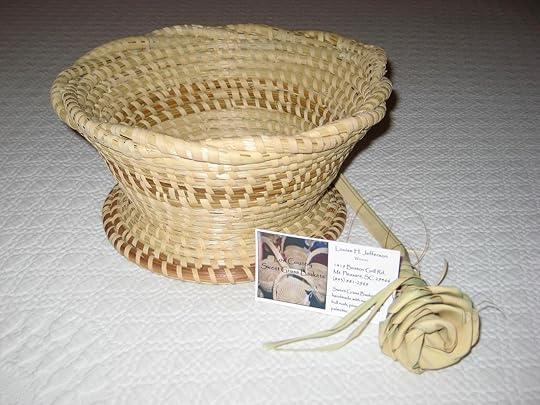 were all related. The best part of my day was when I met Mrs. Louise Jefferson who was weaving sweetgrass baskets and selling her wares at the Charleston visitor center. I bought a beautiful basket (similar to one Camille Cosby purchased from Mrs. Jefferson) and encouraged this kind elder to record her life story. For just a few moments I felt like I was back in my grandmother’s kitchen, listening to her stories and laughing at her jokes…
were all related. The best part of my day was when I met Mrs. Louise Jefferson who was weaving sweetgrass baskets and selling her wares at the Charleston visitor center. I bought a beautiful basket (similar to one Camille Cosby purchased from Mrs. Jefferson) and encouraged this kind elder to record her life story. For just a few moments I felt like I was back in my grandmother’s kitchen, listening to her stories and laughing at her jokes…


August 24, 2012
deep/south
 After spending a little over an hour at the Slave Mart Museum here in Charleston, I was ready to come home. It wasn’t so much a case of information overload as it was a readiness to write…what did I say about timing? It’s everything, so having PMS and listening to the voices of formerly enslaved people can lead to more than a few tears and some rather dramatic ideas for the novel. I highly recommend the Slave Mart Museum; the young women working there are extremely helpful—within minutes of asking for help I was given a list of African American tour guides and walking directions to the Avery Research Center, where I spent the afternoon. As soon as I walked in, I met two interpreters from the Middleton Plantation, which I’ll be touring tomorrow morning. Unfortunately, the shuttle service taking me out there is called “Gone With the Wind, More Than Just a Memory”…but I’m hoping that the black interpreters will balance whatever romanticized (a)historical nonsense I may have to endure. Charleston reminds me of Louisiana—same architecture, same aesthetic, same strange segregation. I walked around this afternoon and felt like I was in the Garden District of New Orleans…kept wondering when I was going to see some black folks. The Avery
After spending a little over an hour at the Slave Mart Museum here in Charleston, I was ready to come home. It wasn’t so much a case of information overload as it was a readiness to write…what did I say about timing? It’s everything, so having PMS and listening to the voices of formerly enslaved people can lead to more than a few tears and some rather dramatic ideas for the novel. I highly recommend the Slave Mart Museum; the young women working there are extremely helpful—within minutes of asking for help I was given a list of African American tour guides and walking directions to the Avery Research Center, where I spent the afternoon. As soon as I walked in, I met two interpreters from the Middleton Plantation, which I’ll be touring tomorrow morning. Unfortunately, the shuttle service taking me out there is called “Gone With the Wind, More Than Just a Memory”…but I’m hoping that the black interpreters will balance whatever romanticized (a)historical nonsense I may have to endure. Charleston reminds me of Louisiana—same architecture, same aesthetic, same strange segregation. I walked around this afternoon and felt like I was in the Garden District of New Orleans…kept wondering when I was going to see some black folks. The Avery  Research Center shed light on the determination of African Americans to uplift the race through education. On the top floor there was an impressive exhibit of sculpture, quilts, and textile art by Bernice Mitchell Tate. The second floor displayed sweetgrass baskets woven in the Gullah community, and there was a recreation of a 19th-century classroom that tugged at my school marm heartstrings. The Avery Normal Institute was founded in 1865 by the American Missionary Association, and I recalled writing a play back in 2006 about a free black woman from New England who moved to the Sea Islands before the Civil War ended to teach in an AMA school for emancipated slaves. Don’t think I ever finished that play, but I’ve already got the AMA in Judah’s Tale. In a way, I could easily write about South Carolina without being here—after touring the Slave Mart I had to come home because my bag was bulging with all the books I’d purchased. I could just hide away in this hotel room, with the windows that face an opposing brick wall, and slip into the past by plowing through those books. But being here gives me the chance to add certain details that might not appear in a book. Just standing in that slave market conjured scenes and introduced me to characters I’d never have “met” in Brooklyn. Tomorrow morning I tour the rice plantation and then in the afternoon I’m doing the Sea Island/African American history tour. I hope my head doesn’t explode before I get a chance to write some of this into the book. Part of me wanted to pull out my laptop and set myself up in the recreated classroom at Avery…sometimes I think I was born in the wrong century!
Research Center shed light on the determination of African Americans to uplift the race through education. On the top floor there was an impressive exhibit of sculpture, quilts, and textile art by Bernice Mitchell Tate. The second floor displayed sweetgrass baskets woven in the Gullah community, and there was a recreation of a 19th-century classroom that tugged at my school marm heartstrings. The Avery Normal Institute was founded in 1865 by the American Missionary Association, and I recalled writing a play back in 2006 about a free black woman from New England who moved to the Sea Islands before the Civil War ended to teach in an AMA school for emancipated slaves. Don’t think I ever finished that play, but I’ve already got the AMA in Judah’s Tale. In a way, I could easily write about South Carolina without being here—after touring the Slave Mart I had to come home because my bag was bulging with all the books I’d purchased. I could just hide away in this hotel room, with the windows that face an opposing brick wall, and slip into the past by plowing through those books. But being here gives me the chance to add certain details that might not appear in a book. Just standing in that slave market conjured scenes and introduced me to characters I’d never have “met” in Brooklyn. Tomorrow morning I tour the rice plantation and then in the afternoon I’m doing the Sea Island/African American history tour. I hope my head doesn’t explode before I get a chance to write some of this into the book. Part of me wanted to pull out my laptop and set myself up in the recreated classroom at Avery…sometimes I think I was born in the wrong century!


August 23, 2012
rainy night in Charleston
 Timing is everything, right? Just before I left for the airport, I checked my email and found some bad news. “If you don’t listen, you’ll feel”—I tell my students that at the start of every semester, and yet here I am nearing 40 and I *still* have not learned to listen to *myself*. I remember having a debate with my therapist once over boundaries—she felt I wasn’t forceful enough when drawing that line in the sand, and I insisted that the people in my life merely swept the line aside. I don’t have problems setting boundaries, I have trouble POLICING my own boundaries once they’ve been set. I said no to a project several months ago, but the editors kept pressing and so I relented and spent a good portion of my summer working on an academic essay. It’s way over the word limit but I think it’s pretty good, and yet today I learned that the editors would like me to remove all traces of my “personal history.” In other words, “Don’t act like you’re a writer. Just be a scholar. Act like you didn’t write the two books you’re analyzing.” I *almost* sent off a terse reply but decided to wait, which meant I drafted endless imaginary emails in my mind during the flight from NYC to Charleston. Then I opened the door to my room here at the hotel and forgot about the endless pressure within academia to be something—someone—other than WHO I AM. I don’t know why I keep ending up in hotel rooms with canopy beds; I actually have a four-poster bed back in Brooklyn, but this feels so much more luxurious. My faculty grant is paying for this trip so I figured I might as well stay in a nice hotel. I keep thinking of that episode of Miranda where her friends seem to have more exciting lives so she claims she’s taking an exotic vacation but really just checks into a nearby hotel. Have you discovered the comic genius of Miranda Hart yet? Here’s a taste, in case you don’t happen to watch PBS on Friday nights…
Timing is everything, right? Just before I left for the airport, I checked my email and found some bad news. “If you don’t listen, you’ll feel”—I tell my students that at the start of every semester, and yet here I am nearing 40 and I *still* have not learned to listen to *myself*. I remember having a debate with my therapist once over boundaries—she felt I wasn’t forceful enough when drawing that line in the sand, and I insisted that the people in my life merely swept the line aside. I don’t have problems setting boundaries, I have trouble POLICING my own boundaries once they’ve been set. I said no to a project several months ago, but the editors kept pressing and so I relented and spent a good portion of my summer working on an academic essay. It’s way over the word limit but I think it’s pretty good, and yet today I learned that the editors would like me to remove all traces of my “personal history.” In other words, “Don’t act like you’re a writer. Just be a scholar. Act like you didn’t write the two books you’re analyzing.” I *almost* sent off a terse reply but decided to wait, which meant I drafted endless imaginary emails in my mind during the flight from NYC to Charleston. Then I opened the door to my room here at the hotel and forgot about the endless pressure within academia to be something—someone—other than WHO I AM. I don’t know why I keep ending up in hotel rooms with canopy beds; I actually have a four-poster bed back in Brooklyn, but this feels so much more luxurious. My faculty grant is paying for this trip so I figured I might as well stay in a nice hotel. I keep thinking of that episode of Miranda where her friends seem to have more exciting lives so she claims she’s taking an exotic vacation but really just checks into a nearby hotel. Have you discovered the comic genius of Miranda Hart yet? Here’s a taste, in case you don’t happen to watch PBS on Friday nights…



August 16, 2012
at a loss
 My syllabi are done. My home workspace is almost in order—the second filing cabinet arrives today and once it’s assembled I’ll be done with the thigh-high stack of paper on the floor. Next week advising starts and then I head to South Carolina to conduct research for Judah’s Tale before classes start on the 28th. But right now I’m at a loss for words. On Monday I met with Ed Spicer and he told me about an amazing, innovative activity he does with his first graders. For five minutes, the children are allowed to daydream—no prompts, no guidelines, just time to sit and dream. Then when the five minutes are up, the children share their dream with a partner and the partner suggests ways to extend the dream. I often tell people that writing is 70% dreaming. And most days, I’m fine with that. But when you want the words to come and they don’t…you have to take a deep breath, close your eyes, and keep on dreaming…
My syllabi are done. My home workspace is almost in order—the second filing cabinet arrives today and once it’s assembled I’ll be done with the thigh-high stack of paper on the floor. Next week advising starts and then I head to South Carolina to conduct research for Judah’s Tale before classes start on the 28th. But right now I’m at a loss for words. On Monday I met with Ed Spicer and he told me about an amazing, innovative activity he does with his first graders. For five minutes, the children are allowed to daydream—no prompts, no guidelines, just time to sit and dream. Then when the five minutes are up, the children share their dream with a partner and the partner suggests ways to extend the dream. I often tell people that writing is 70% dreaming. And most days, I’m fine with that. But when you want the words to come and they don’t…you have to take a deep breath, close your eyes, and keep on dreaming…


August 13, 2012
the Caribbean Adventure Series
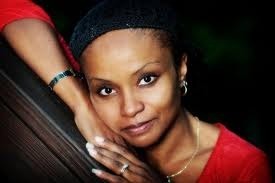 Last month I had the pleasure of meeting Carol Ottley-Mitchell, author and publisher of the Caribbean Adventure Series. Carol kindly agreed to answer a few questions about her books and her role as publisher/promoter of Caribbean children’s literature.
Last month I had the pleasure of meeting Carol Ottley-Mitchell, author and publisher of the Caribbean Adventure Series. Carol kindly agreed to answer a few questions about her books and her role as publisher/promoter of Caribbean children’s literature.
Describe your evolution from reader to writer to publisher–did any particular book inspire you as a child? Why write for children and why focus on the Caribbean?
Evolution…perfect description. I read voraciously as a child, everything I could put my eyes on. My drive to write my own books developed when I had my children. They inherited my love of reading and fell in love with Roald Dahl, the Magic Tree House, and many others. I wanted them to also read books that reflected their heritage, so I searched for books with children of color and—even more importantly to me—children of the Caribbean. I was frustrated with the choices. There are good Caribbean-based books for children out there, but I found that many of the ones I came across were difficult to read or emphasized stereotypes that were not necessarily a part of how I saw myself as a Caribbean person. The straw that broke the camel’s back may have been one book, I believe it was a Macmillan publication, in which a family was having a snack and the children were snickering about what Daddy was drinking, which turned out, from the illustration, to be “Rum.” I could not see how this added value to a story aimed at 6-year-olds and I determined to do better.
I went up to Brimstone Hill in St. Kitts (one of my favorite places in the world) one April and I thought—what a great place for a kid to have an adventure, and the Caribbean Adventure Series was born!
The second reason that I write about the Caribbean is that I believe in writing about what I know. I have lived in the US on and off for 15 years, but I have never quite assimilated. I would not feel comfortable writing about a society that I appreciate but often don’t understand. This may also explain why after living for three years in Ghana, I have only written one story set in Africa.
African American author Sherley Anne Williams once despaired that there was nowhere in the past she could go (as a black woman) and be free. Your three black child protagonists journey into the past but race never seems to be a problem for them–even in the 1600s. How do you want black children to relate to the past?
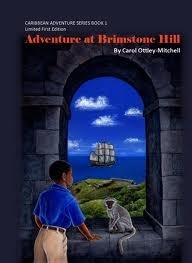 The first book in the Caribbean Adventure Series, Adventure at Brimstone Hill, kind of wrote itself. There was never a drawing board with a master plan of how it would end. Not the textbook approach to writing, I know. When I got to the point where the children travel into the past and meet the British General, I was stuck for quite a while. It wasn’t writer’s block; I was battling with a big question. How would a white General react to two black children showing up in his office with a monkey, no less? Did I want to introduce a discussion of slavery and black-white relations into this particular book? I decided to stick to my plan to create a light book that portrayed children in the Caribbean the way that they may see themselves. Many black Caribbean children have the benefit of growing up in an environment where they are the majority, where the successful adults around them also look like them. So it would be natural for the children to meet a Caucasian on their island and question his legitimacy rather than their own.
The first book in the Caribbean Adventure Series, Adventure at Brimstone Hill, kind of wrote itself. There was never a drawing board with a master plan of how it would end. Not the textbook approach to writing, I know. When I got to the point where the children travel into the past and meet the British General, I was stuck for quite a while. It wasn’t writer’s block; I was battling with a big question. How would a white General react to two black children showing up in his office with a monkey, no less? Did I want to introduce a discussion of slavery and black-white relations into this particular book? I decided to stick to my plan to create a light book that portrayed children in the Caribbean the way that they may see themselves. Many black Caribbean children have the benefit of growing up in an environment where they are the majority, where the successful adults around them also look like them. So it would be natural for the children to meet a Caucasian on their island and question his legitimacy rather than their own.
While the Caribbean Adventure Series is not intended to influence how children relate to the past from the point of view of race, it does reflect how I would recommend that our children relate to their past. It is important for children to understand why we of African descent are in the Caribbean, not in a way that engenders bitterness or self-hatred, but in a way that develops the self-confidence that comes with knowing one’s history.
What are the greatest rewards and the biggest challenges of being a publisher?
 Rewards? The children, always the children. When we were in Ghana, children who had read the books or been at one of my readings would approach me to compliment the books or to say “Auntie, when is the next book coming out?” This never gets old and makes my day, perhaps my year, and inspires me to keep writing and to keep looking for good children’s books to publish.
Rewards? The children, always the children. When we were in Ghana, children who had read the books or been at one of my readings would approach me to compliment the books or to say “Auntie, when is the next book coming out?” This never gets old and makes my day, perhaps my year, and inspires me to keep writing and to keep looking for good children’s books to publish.
Challenges? How much time do I have? Just kidding. If I had to pick one thing, I would say that the biggest challenge is marketing. Now that my publishing company CaribbeanReads has six books in distribution, we have a good understanding of the process of getting the books from raw manuscript to the press. The difficult part, once you have the book, is to get the word out that you have published a fantastic book and to get people (besides your family and friends) to buy a copy.
What is your vision for the future re: literacy in the black community and/or the African diaspora?
The future of literacy in the African diaspora has to be viewed from both a demand and a supply side. We need to read, read, read. As black people, we often have to overcome initial expectations about our abilities and our level of intelligence. We should not overcompensate, but we need the tools to ensure that when we go into that job interview, into the board room, or show up for school that we can contribute in a way that forces others to forget their preconceptions and question their prejudices. Being able to speak intelligently about our area of expertise and more is an important part of that and reading widely helps.
 On the supply side, we need to have more books written that portray black people—our past, our present, and our future—in a balanced, reality-based light. I remember a friend of mine from Ghana saying that from years of watching African soap operas, she thought that relationships were supposed to be male-dominated and violent and so accepted such relationships as being natural. What we read about ourselves and how we see ourselves portrayed affects our psyche. No race is uniform and our literature should reflect that.
On the supply side, we need to have more books written that portray black people—our past, our present, and our future—in a balanced, reality-based light. I remember a friend of mine from Ghana saying that from years of watching African soap operas, she thought that relationships were supposed to be male-dominated and violent and so accepted such relationships as being natural. What we read about ourselves and how we see ourselves portrayed affects our psyche. No race is uniform and our literature should reflect that.
It has been great chatting with you!
Carol is an Information Technology professional. Her main profession is as General Manager of Leyton Microcomputer Services, an Information Technology firm based in St. Kitts. Born in Nevis, Carol has lived in several Caribbean countries. She spent a large part of her formative years in Trinidad, where one of her favorite pastimes was competing with her father to see who could compose the best humorous lyrics to existing songs. This was just the beginning of her interest in creative writing. Currently, Carol lives and writes in Virginia. Carol is married with two children who are her inspiration and her biggest critics. (Author Photo by Jaxon Photography)


August 9, 2012
black dog
Found a photo online of a “black dog” coin. It seems they took these French coins, stamped “Nevis” or “N” on them, and they then circulated as 7 black dogs instead of 7 sous:


August 8, 2012
break
 I’m thinking about taking a break from the blog. Spoke with my cousin a few days ago and she’s worried that I’m putting too much of myself “out there.” The internet can create a false sense of intimacy, and I definitely don’t want some psycho latching onto me because of what I write on my blog. But I also don’t want to feel like I can’t be myself online…to quote June Jordan, “Who the hell set things up like this?” Not me. I’ve got novels to write so maybe taking a break isn’t such a bad thing. Right now I’m reading Vincent Hubbard’s Swords, Ships & Sugar: History of Nevis to 1900. And I had to stop and blog because I just found a possible clue—in the late 18th and early 19th centuries, Nevis used silver coins issued by France for use in their Caribbean and South American colonies. These coins—”sous”—were also called “black dogs” by locals. If the enslaved woman I discovered in the 1817 slave register was 60 years old at the time, she would have been born around 1757. Could her unusual name somehow be linked to these coins? So many possibilities…
I’m thinking about taking a break from the blog. Spoke with my cousin a few days ago and she’s worried that I’m putting too much of myself “out there.” The internet can create a false sense of intimacy, and I definitely don’t want some psycho latching onto me because of what I write on my blog. But I also don’t want to feel like I can’t be myself online…to quote June Jordan, “Who the hell set things up like this?” Not me. I’ve got novels to write so maybe taking a break isn’t such a bad thing. Right now I’m reading Vincent Hubbard’s Swords, Ships & Sugar: History of Nevis to 1900. And I had to stop and blog because I just found a possible clue—in the late 18th and early 19th centuries, Nevis used silver coins issued by France for use in their Caribbean and South American colonies. These coins—”sous”—were also called “black dogs” by locals. If the enslaved woman I discovered in the 1817 slave register was 60 years old at the time, she would have been born around 1757. Could her unusual name somehow be linked to these coins? So many possibilities…
Just booked my last trip of the summer, but will keep that to myself for now. Back to the book…


August 6, 2012
SCBWI’s On-The-Verge Emerging Voices Award
I heard this award was coming and now it’s official:
August 5, 2012, LOS ANGELES-–The Society of Children’s Book Writers and Illustrators (SCBWI) announced the creation of the On-The-Verge Emerging Voices Award at their 41st Annual Conference in Los Angeles. The annual award, established by SCBWI and funded by Martin and Sue Schmitt, will be given to two writers or illustrators who are from ethnic and/or cultural backgrounds that are traditionally under-represented in children’s literature in America and who have a ready-to-submit completed work for children. The purpose of the grant is to inspire and further the emergence of diverse writers and illustrators of children’s books.
The work will be judged by an SCBWI committee and two winners will each receive an all-expenses paid trip to the SCBWI Winter Conference in New York to meet with editors and agents, a press release to all publishers, a year of free membership to SCBWI, and an SCBWI mentor for a year. Deadline for submission is November 15, 2012. The winners will be announced December 15, 2012. The On-The-Verge Emerging Voices Award will be presented at the 2013 SCBWI Winter Conference in New York. Submission guidelines and information can be found here.



